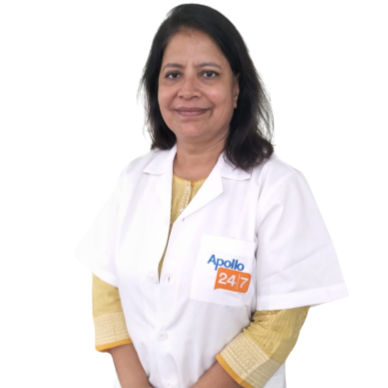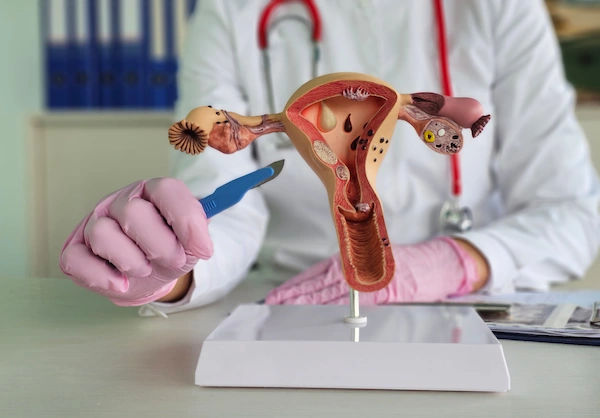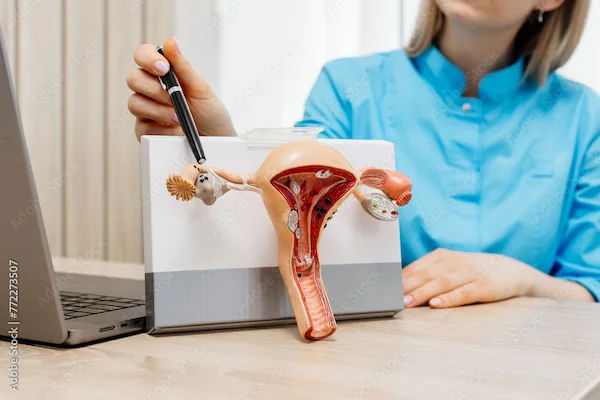Emergency Hysterectomy During Childbirth
Learn about emergency hysterectomy during childbirth, a critical procedure performed to save lives in severe cases of postpartum bleeding. Understand the reasons, risks, recovery, and long-term impact on women’s health.

Written by Dr. Dhankecha Mayank Dineshbhai
Reviewed by Dr. Rohinipriyanka Pondugula MBBS
Last updated on 13th Jan, 2026

Introduction
Bringing a new life into the world is a beautiful experience, but sometimes, unexpected complications can arise. One such rare but serious situation is an emergency hysterectomy during childbirth. If you or a loved one has faced this or want to be informed, this article will help you understand what it means, why it happens, and how to cope afterwards.
What Is an Emergency Hysterectomy During Childbirth?
An emergency hysterectomy is the surgical removal of the uterus (womb) performed during or immediately after childbirth when a woman’s life is at risk due to severe bleeding or other complications. This procedure is only done when all other treatments fail to control life-threatening bleeding. While most women deliver babies without needing this surgery, it can be a lifesaving measure in extreme cases.
Why Might an Emergency Hysterectomy Be Needed?
The most common reasons for an emergency hysterectomy during childbirth include:
1. Uncontrolled Postpartum Haemorrhage (PPH): Severe bleeding after delivery that doesn’t stop with medications or other procedures.
2. Placenta Accreta Spectrum (PAS): When the placenta grows too deeply into the uterine wall and cannot detach after birth.
3. Uterine Rupture: A tear in the uterus, often due to previous C-sections or other uterine surgeries.
4. Severe Infection or Cancer: Rarely, infections or undiagnosed cancers may require immediate removal of the uterus.
How Does It Affect a Woman’s Health?
An emergency hysterectomy is a major surgery with both physical and emotional effects:
1. Physical Effects:
No More Pregnancies: Since the uterus is removed, future pregnancies are not possible.
Hormonal Changes: If the ovaries are also removed (oophorectomy), menopause begins immediately, leading to symptoms like hot flashes and mood swings.
Recovery Time: Healing takes weeks, with restrictions on lifting and physical activity.
2. Emotional Effects:
Grief Over Fertility Loss: Many women feel sadness if they had planned more children.
Trauma from Emergency Surgery: The sudden nature of the procedure can be emotionally overwhelming.
Body Image Concerns: Some women may struggle with changes in their bodies.
Consult Top Specialists for Personalised Tips
Recovery and Care After an Emergency Hysterectomy
Recovering from an emergency hysterectomy takes time and support. Here are some ways to help with healing:
1. Physical Recovery:
Rest: Avoid strenuous activities for at least 6 weeks.
Pain Management: Take prescribed medications as directed.
Follow-Up Visits: Regular check-ups ensure proper healing.
2. Emotional Support:
Talk to a Counsellor: Therapy can help process feelings of loss or trauma.
Join Support Groups: Connecting with other women who’ve had similar experiences can be comforting.
3. Lifestyle Adjustments:
Pelvic Floor Exercises: Strengthening pelvic muscles can help with bladder control.
Healthy Diet & Hydration: Supports healing and overall well-being.
Can This Be Prevented?
While not all cases can be prevented, some risk factors can be managed:
Early Detection of Placenta Issues: Ultrasounds can identify placenta accreta before delivery.
Discussing Previous Surgeries: If you’ve had C-sections or uterine surgeries, inform your doctor early in pregnancy.
Choosing Experienced Medical Teams: Hospitals with expertise in high-risk pregnancies can reduce complications.
When to Seek Help?
If you experience any of the following after childbirth, seek medical help immediately:
Heavy bleeding that soaks pads quickly
Severe abdominal pain
High fever or signs of infection
Extreme fatigue or dizziness
Conclusion
An emergency hysterectomy during childbirth is a rare but life-saving procedure. While it brings physical and emotional challenges, with proper care and support, women can recover and lead healthy lives. If you have concerns about childbirth risks or need post-surgery guidance, Apollo 24|7 offers expert consultations to help you through your journey.
Consult Top Obstetrics and Gynaecology Surgeon
Consult Top Obstetrics and Gynaecology Surgeon

Dr Bhawna Garg
Gynaecological Oncologist
26 Years • MBBS, MS, (PGI MS ROHTAK) FELLOWSHIP GYNECOLOGY ONCOLOGY, (CANCER INSTITUTE CHENNAI)
Delhi
Apollo Hospitals Indraprastha, Delhi

Dr. Shruti I
Obstetrician and Gynaecologist
7 Years • MBBS, MS (OBSTETRICS & GYNAECOLOGY)
Bangalore
Apollo Clinic Bellandur, Bangalore

Dr. Plabani Sarkar
Obstetrician and Gynaecologist
17 Years • Advanced Diploma in Reproductive Medicine, University of Schleswig Holstein Kiel, Germany 2024 Fellowship - Reproductive Endocrinology and Infertility, PGIMER Chandigarh 2021 – 2022 Specialized in female endocrinology, endometriosis & male infertility. Certification in Reproductive Genetics,Valencia,Spain 2024 Certification in Oncofertility, American Society of Reproductive Medicine 2024 Certification in Obstetrics & Gynecological Ultrasounds,NHS-UK(Royal College of Radiologists) 2024 D.N.B. - Obstetrics & Gynaecology, NBE, New Delhi 2021 MD - Obstetrics & Gynaecology, AIIMS, New Delhi 2014 - 2016 Specialized in Laparoscopic, Hysteroscopic procedures & Infertility treatments. MBBS, R.G. Kar Medical College, Kolkata 2007 - 2013 Honours in Preventive & Social Medicine. Gold Medal in Forensic Science & Medicine.
Bengaluru
Apollo Clinic Mahadevapura, Bengaluru

Dr. Saheli Kapat
Obstetrician and Gynaecologist
11 Years • MBBS, DNB Obstetrics & Gynaecology,FMAS(Fellowship in Minimal access surgery)
Kolkata
Dr. Saheli Kapat's Clinic, Kolkata

Dr. Abhilasha Kumar
Obstetrician and Gynaecologist
30 Years • MBBS, MS, DCG(Obstetrician and cosmetic gynaecologist)
Kolkata
Abhilasha Clinic, Kolkata
Consult Top Specialists for Personalised Tips

Dr Bhawna Garg
Gynaecological Oncologist
26 Years • MBBS, MS, (PGI MS ROHTAK) FELLOWSHIP GYNECOLOGY ONCOLOGY, (CANCER INSTITUTE CHENNAI)
Delhi
Apollo Hospitals Indraprastha, Delhi

Dr. Shruti I
Obstetrician and Gynaecologist
7 Years • MBBS, MS (OBSTETRICS & GYNAECOLOGY)
Bangalore
Apollo Clinic Bellandur, Bangalore

Dr. Plabani Sarkar
Obstetrician and Gynaecologist
17 Years • Advanced Diploma in Reproductive Medicine, University of Schleswig Holstein Kiel, Germany 2024 Fellowship - Reproductive Endocrinology and Infertility, PGIMER Chandigarh 2021 – 2022 Specialized in female endocrinology, endometriosis & male infertility. Certification in Reproductive Genetics,Valencia,Spain 2024 Certification in Oncofertility, American Society of Reproductive Medicine 2024 Certification in Obstetrics & Gynecological Ultrasounds,NHS-UK(Royal College of Radiologists) 2024 D.N.B. - Obstetrics & Gynaecology, NBE, New Delhi 2021 MD - Obstetrics & Gynaecology, AIIMS, New Delhi 2014 - 2016 Specialized in Laparoscopic, Hysteroscopic procedures & Infertility treatments. MBBS, R.G. Kar Medical College, Kolkata 2007 - 2013 Honours in Preventive & Social Medicine. Gold Medal in Forensic Science & Medicine.
Bengaluru
Apollo Clinic Mahadevapura, Bengaluru

Dr. Saheli Kapat
Obstetrician and Gynaecologist
11 Years • MBBS, DNB Obstetrics & Gynaecology,FMAS(Fellowship in Minimal access surgery)
Kolkata
Dr. Saheli Kapat's Clinic, Kolkata

Dr. Abhilasha Kumar
Obstetrician and Gynaecologist
30 Years • MBBS, MS, DCG(Obstetrician and cosmetic gynaecologist)
Kolkata
Abhilasha Clinic, Kolkata




